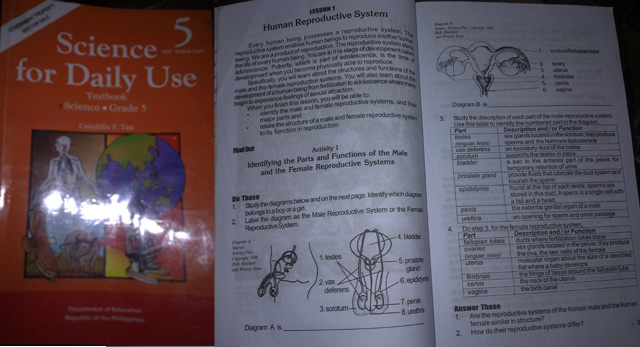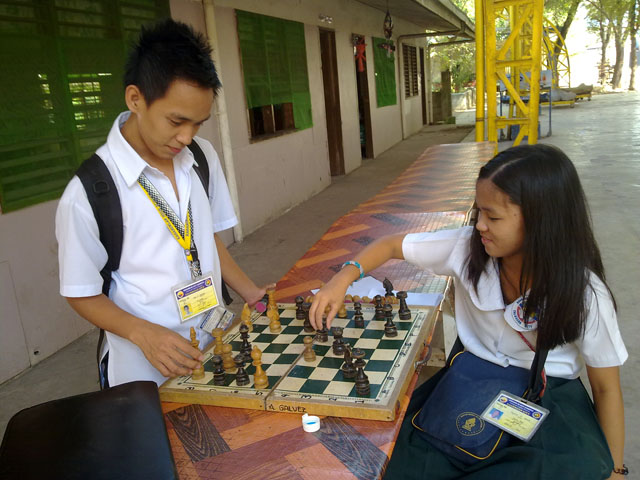As RH bill awaits PNoy's signature, Pinoys look forward to its benefits
As the much-debated reproductive health bill awaits the signature of President Benigno Aquino III, 27-year-old Joverly Santos is also eagerly waiting for the time she will be able to avail of the free services the law promises to bring. "Oo, maga-access ako ng RH services. Sa ngayon tatlo na 'yung anak ko, gusto ko na magpa-ligate," Joverly, a mother of a seven-, five-, and one-year-old children, told GMA News Online. Under the bill, the State shall promote programs that enable individuals and couples to have the number of children they desire with due consideration to the health, particularly of women, and the resources available and affordable to them with due consideration to their religious convictions. Joverly said that although ligation is cheaper in public hospitals than in private ones, it is still beyond her family's income — her husband, who peddles paintings in Quezon City for a living, earns around P300 to P500 for every item sold. "Porsyentuhan lang po. Kukuha kami ng painting, ibebenta. Minsan wala pang benta,minsan meron naman. Tsambahan," Joverly said. When GMA News Online saw her, she was sharing a small pork dish with her children at a roadside eatery. “Factory of children” Joverly's family is one of the many informal settlers in Caloocan City's most depressed areas. Like her neighbors, they reside in a rickety clapboard house, with little to no utilities. Her neighbors described their area as a "factory of children," many of the kids accidentally conceived by young and unemployed parents. “Madami 'yan (bata) dito, hindi planado. 'Yung tatay nga nitong apo ko walang trabaho,” said Linda Ugang, 41, while rocking her three-month-old grandchild to sleep. Tricycle driver Ronnie Rivera, a 26-year-old father of two, agreed. “'Yung iba anak lang nang anak, hindi na iniisip ang kinabukasan ng anak nila. Basta pag naging magsyota sila, mag-asawa, ganun,” he said. He hoped the enactment of the RH law would lessen incidents of unwanted pregnancies and even abortion. “Nangyayari naman 'yan (abortion),” Ronnie said. “Mga batang nagbubuntis, natatakot sa magulang.” RH bill aims to inform and educate adolescents, 10 to 19 years, of their reproductive health, responsible teenage behavior, gender and development, values formation, and children's rights, among others. Ronnie, however, said there are more important things the government should focus on, like employment. “Hindi lang dapat 'yun (RH) ang pagtuunan ng gobyerno. Dapat trabaho sa mahihirap dahil kung walang trabaho mas malaki ang problema ng tao,” he said. Joverly said he does not want a big family, saying this would take toll on their finances. "Mahirap kasi paano kung isang araw mawalan ng trabaho 'yung asawa ko, kawawa 'yung mga bata." Sex education Santos, however, opposed the provision on the RH bill that states that reproductive health and sexuality education should be taught to children aged 10 to 19. "Bata pa 'yung mga 'yan. Maganda ituro 'yan sa mag-asawa lang, sa mga 20 anyos pataas," she said. She feared that it would only arouse sexual curiosity among the youth. "Dyan nga matututo ang mga bata, syempre magtatanong yan 'Paano ba un?' E paano kung gawin ng mga bata yung example nila. Imbes na matitino ang mga bata e ganun ang mangyayari," she said. It was the same view expressed by Science teacher Rowelia Santiago-Paule of Kasarinlan Elementary School, who said it is enough for elementary students to learn the basics of their reproductive system. “Itinuturo naman sa mga bata talaga yan, wala naman masama. Ang may problema siguro sa high school, sa elementary hindi masyado,” she said in a separate interview. Grade five book “Science for Daily Use,” which public schools use, allots five lessons on human reproductive system, fertilization, physical changes during puberty, menstrual cycle and taking care of the reproductive organ.  Paule believed that reproductive health education should both be learned at home and in school. “Dapat pareho sa bahay at paaralan para 'yung hindi maituro ng magulang, ituturo sa eskwelahan,” said Paule, 48, a mother of two high school students aged 12 and 13. Mrs. Marites Buenaventura-Cruz, principal of Sampalukan Elementary School in Caloocan City, said RH education is already integrated in several subjects being taught to students such as Good Manners and Right Conduct; and Heograpiya, Kasaysayan at Sibika and Edukasyong Pantahanan at Pangkabuhayan. “Yung sa human reproduction natatalakay naman, integrated sa maraming subjects. Ano pa ba ang hindi natin naituro? Although hindi pinag-usapan ang sexual intercourse, mating,” she said. “Dapat pa bang ipakita step by step (ang intercourse) e sacred sa atin yun? Hindi naman ata dinedemonstrate yan kahit sa high school. Naturally learned yan katulad ng breastfeeding,” she added. Mardy Ocampo, Physics teacher at Kasarinlan High School in Caloocan City, believed teaching sex education to high school students is a good although it would only encourage promiscuity among youth — the same argument raised by lawmakers opposed to the RH bill as well as the Catholic Church, the most vocal of all RH critics. “Parang in-open mo na sa kanila, nawala yung parameters, 'yung boundaries. Curious sila at ie-explore nila. A subject on reproductive health is necessary but sex education envelops a different aspect,” he says. President Benigno Aquino III has said that the situation of a teenage mother in Baseco Compound in Tondo, Manila supposedly cemented his decision to certify the RH bill as urgent. In 2011, Aquino met a 16-year-old girl who is already a mother two. A year later, he learned that the young mother is pregnant with her third child with a different partner. Parental advisory Fourth year high school student Angelica Galvez believed teenage mothers and fathers were those who did not pay attention to what their teachers were saying. “Siguro hindi nakikinig kasi tinuturo naman sa klase lahat yan, sa Gender and Development. Yung iba din nanggagaling sa mga kasamahan nila, naapektuhan ng environment,” she said, adding she favors the RH bill.
Paule believed that reproductive health education should both be learned at home and in school. “Dapat pareho sa bahay at paaralan para 'yung hindi maituro ng magulang, ituturo sa eskwelahan,” said Paule, 48, a mother of two high school students aged 12 and 13. Mrs. Marites Buenaventura-Cruz, principal of Sampalukan Elementary School in Caloocan City, said RH education is already integrated in several subjects being taught to students such as Good Manners and Right Conduct; and Heograpiya, Kasaysayan at Sibika and Edukasyong Pantahanan at Pangkabuhayan. “Yung sa human reproduction natatalakay naman, integrated sa maraming subjects. Ano pa ba ang hindi natin naituro? Although hindi pinag-usapan ang sexual intercourse, mating,” she said. “Dapat pa bang ipakita step by step (ang intercourse) e sacred sa atin yun? Hindi naman ata dinedemonstrate yan kahit sa high school. Naturally learned yan katulad ng breastfeeding,” she added. Mardy Ocampo, Physics teacher at Kasarinlan High School in Caloocan City, believed teaching sex education to high school students is a good although it would only encourage promiscuity among youth — the same argument raised by lawmakers opposed to the RH bill as well as the Catholic Church, the most vocal of all RH critics. “Parang in-open mo na sa kanila, nawala yung parameters, 'yung boundaries. Curious sila at ie-explore nila. A subject on reproductive health is necessary but sex education envelops a different aspect,” he says. President Benigno Aquino III has said that the situation of a teenage mother in Baseco Compound in Tondo, Manila supposedly cemented his decision to certify the RH bill as urgent. In 2011, Aquino met a 16-year-old girl who is already a mother two. A year later, he learned that the young mother is pregnant with her third child with a different partner. Parental advisory Fourth year high school student Angelica Galvez believed teenage mothers and fathers were those who did not pay attention to what their teachers were saying. “Siguro hindi nakikinig kasi tinuturo naman sa klase lahat yan, sa Gender and Development. Yung iba din nanggagaling sa mga kasamahan nila, naapektuhan ng environment,” she said, adding she favors the RH bill.




